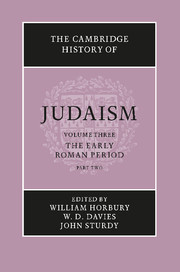Book contents
- Frontmatter
- 1 The archaeology of Palestine 63 bce–ce 70
- 2 The Herodian Temple
- 3 Recent archaeology in Palestine: achievements and future goals
- 4 The contribution of Jewish inscriptions to the study of Judaism
- 5 The social, economic and political history of Palestine 63 bce–ce 70
- 6 The Diaspora in the Roman period before ce 70
- 7 The Gentiles in Judaism 125 bce–ce 66
- 8 Gentiles as seen by Jews after ce 70
- 9 The synagogue
- 10 The Temple and the synagogue
- 11 The early liturgy of the synagogue
- 12 Women in the synagogue
- 13 The Pharisees
- 14 The Sadducees – their history and doctrines
- 15 The Essenes
- 16 The baptist sects
- 17 The troublemakers
- 18 The Samaritans and their sects
- 19 Galilean Judaism and Judaean Judaism
- 20 Jesus: from the Jewish point of view
- 21 Paul: from the Jewish point of view
- 22 Jewish Christianity
- 23 Apocalyptic: the disclosure of heavenly knowledge
- 24 The Qumran sectarian writings
- 25 The Dead Sea Scrolls and pre-Tannaitic Judaism
- 26 Prayer in the Qumran Texts
- 27 Philo of Alexandria
- 28 Josephus (ce 37–c. 100)
- 29 The rabbi in second-century Jewish society
- 30 The Hellenistic–Roman Diaspora ce 70–ce 235: the archaeological evidence
- 31 The legacy of Egypt in Judaism
- 32 Jewish elements in gnosticism and magic c.ce 70–c.ce 270
- Bibliographies
- Index
- References
16 - The baptist sects
Published online by Cambridge University Press: 28 March 2008
- Frontmatter
- 1 The archaeology of Palestine 63 bce–ce 70
- 2 The Herodian Temple
- 3 Recent archaeology in Palestine: achievements and future goals
- 4 The contribution of Jewish inscriptions to the study of Judaism
- 5 The social, economic and political history of Palestine 63 bce–ce 70
- 6 The Diaspora in the Roman period before ce 70
- 7 The Gentiles in Judaism 125 bce–ce 66
- 8 Gentiles as seen by Jews after ce 70
- 9 The synagogue
- 10 The Temple and the synagogue
- 11 The early liturgy of the synagogue
- 12 Women in the synagogue
- 13 The Pharisees
- 14 The Sadducees – their history and doctrines
- 15 The Essenes
- 16 The baptist sects
- 17 The troublemakers
- 18 The Samaritans and their sects
- 19 Galilean Judaism and Judaean Judaism
- 20 Jesus: from the Jewish point of view
- 21 Paul: from the Jewish point of view
- 22 Jewish Christianity
- 23 Apocalyptic: the disclosure of heavenly knowledge
- 24 The Qumran sectarian writings
- 25 The Dead Sea Scrolls and pre-Tannaitic Judaism
- 26 Prayer in the Qumran Texts
- 27 Philo of Alexandria
- 28 Josephus (ce 37–c. 100)
- 29 The rabbi in second-century Jewish society
- 30 The Hellenistic–Roman Diaspora ce 70–ce 235: the archaeological evidence
- 31 The legacy of Egypt in Judaism
- 32 Jewish elements in gnosticism and magic c.ce 70–c.ce 270
- Bibliographies
- Index
- References
Summary
PROBLEM OF DEFINITIONS AND SOURCES
Scholars have come to apply the term ‘baptist sects’ to a series of phenomena in the post-biblical (‘early Jewish’) and early Christian phases of religious history. The most comprehensive monograph written on the subject to date is, in fact, entitled Le mouvement baptiste en Palestine et Syrie (150 av. J-C–300 ap. J-C). The meaning and legitimacy of such a title are indeed, arguable, depending on one's interpretation of ‘baptism’ and of its liturgical significance in a religious community. Not every community practising immersion, of whatever form, is a ‘baptist sect’. The act of baptism must occupy a central place in its ritual, that is, should be more than a preparatory ceremony, and must bear a special significance in the beliefs of the sect. One may also think in terms of the ceremony as a sacrament, different from the common and widespread rites of lustration or ablution, even if this is not apparent in mere externals. The ceremony commonly takes the form of partial or total immersion of the believer in ‘flowing’ (that is, running) water, so the expression ‘bath of immersion’ or baptism (baptisma) is quite in order. The periodic repetition of this ceremony is certainly a distinctive feature of the typical ‘baptist sects’, but is not necessarily their principal characteristic, since a single celebration – in its central role referred to above – may be a sufficient hallmark of a community which has, in this very respect, cut itself off from a larger community, that is, become a sect. Most representatives of these movements are both ‘sectarian’ and ‘heretical’.
- Type
- Chapter
- Information
- The Cambridge History of Judaism , pp. 471 - 500Publisher: Cambridge University PressPrint publication year: 1999
References
- 1
- Cited by

